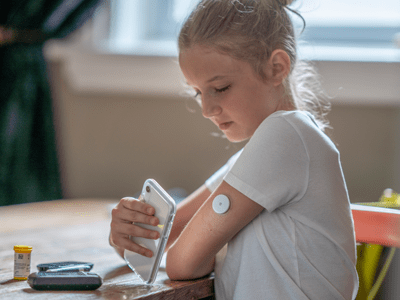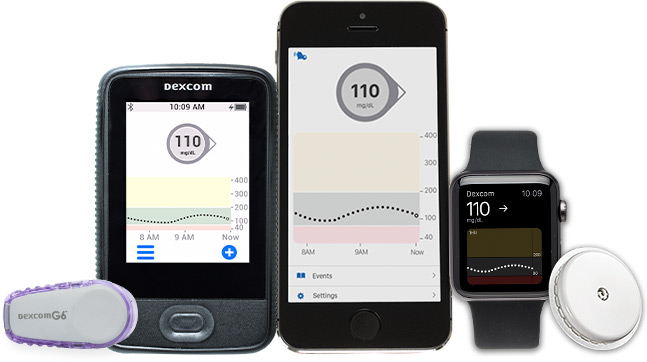Supporting a Child Living with Diabetes
“It’s OK to not be OK. Some days are just harder than others.”
This post was reviewed by our Director of Clinical Excellence and Oversight.
While there are different opinions about where the quote above comes from, these words of wisdom are hard to dispute. If you are the parent or caregiver to a child or adolescent with a chronic illness, including the approximately 210,000 Americans under age 20 estimated to have diagnosed diabetes, these words can be particularly meaningful.
Caregivers to people of any age are doing some of the world’s most difficult and meaningful work. As a parent charged with managing your child’s health, it is normal to feel overwhelmed or incapable at first. However, research shows that the more information and support you have, the more you’ll be able to help your child avoid complications and live their best life with diabetes.

The News No One Wants to Get
No parent wants to hear that their child has a chronic disease. “Your child has diabetes” may turn a parent’s world upside down. You may feel sad, or angry, even as you deal with feelings of guilt, anxiety, and fear.
Sooner than you’d imagine, you’ll become an expert in how to monitor glucose levels, give insulin shots, and count carbohydrates. You’ll master the fine art of calculating the effect of exercise, food, and stress on blood sugar. But before you do all that, you’ll need to have “The Talk” with your child: the one where you acknowledge that life has changed, but that, together, you are bigger than this disease called diabetes.
When speaking with your child, experts advise that parents avoid the temptation to sugarcoat (pun intended) the situation. Regardless of your child’s age, always tell the truth, and answer questions to the best of your ability in a way the child will understand. When speaking with your child be sure to stress that diabetes is not their fault, and that it’s probably not going away. Speak in a positive tone and try to avoid sounding negative, such as saying things like, “you can’t have cake or cookies anymore.”

As the child ages, link self-care to other “older kid” activities such as going to sleepovers or summer camp. Offer praise for a grade-schooler preparing his own diabetic-friendly lunch.
As a parent of an adolescent with diabetes, you’ll probably be called on to help manage the stigma of living with a chronic disease. The conversations about drugs, alcohol, and sexuality become even more important because of the possible effect of behavior choices on diabetes and overall health.

Regardless of your child’s age, always tell the truth, and answer questions to the best of your ability.
Why Go It Alone?
Like their children living with diabetes, parents need encouragement and support. Your child’s care team may be able to make recommendations for parent groups with other children who are living with diabetes. Your local children’s hospital may offer support groups, and other resources as well.

If your child has type 1 diabetes, check out the PEP (Parents Empowering Parents) Squad group on Facebook at https://www.facebook.com/groups/PEPsquadDRI/. PEP is managed by the Diabetes Research Institute Foundation. It’s a closed group, so you’ll need to be approved, which involves answering a few questions.
The foundation describes PEP as a place to “connect with other parents of children with diabetes, share stories and struggles, complain, vent, or mentor and shed new light.” Members say they can find someone to lean on “even in the wee hours after that 3 a.m. blood sugar check.”

Conversations with your teen about drugs, alcohol, and sexuality become even more important because of the possible effect of behavior choices on diabetes and overall health.
You’ve Got This
Like all chronic conditions, Diabetes affects the whole family. Sometimes, siblings feel resentful that the brother or sister with diabetes is getting so much attention. And they may grumble about dietary changes or having to go along to doctor’s appointments. There are no easy answers, but focus on open, honest communication, expect to mediate disagreements, and find fun ways for the family to spend time together. Other tips we love:

Find that superpower. Help your child identify and build on a special strength, talent, or skill. It’s a great way for children to realize that they are more than their diabetes.

Check in regularly. Schedule an emotional check-in from time to time. This is a chance to find out how your child is feeling about things, and to review any obstacles or recent wins.

Promote independence. It’s easy to understand why some parents of children with chronic conditions become overprotective. Some even lower their expectations, compared to siblings who do not have the condition. But that type of approach does not encourage independence and self-direction. Instead, try to use diabetes to build resilience, starting with small self-care steps and building to higher levels of competence and confidence.

Let others in. Depending on your child’s age, you’ll want to advise teachers, sitters, friends, coaches, and other family members about the situation. Older kids can help decide who needs to know. You may be surprised to discover an unexpected ally in a teacher, classmate, or scout leader.

Embrace Technology. Continuous Glucose Monitors, the systems that let someone with diabetes monitor their blood sugar 24/7 without needlesticks, may be an option for children with type 1 diabetes. The FreeStyle Libre 2 system has been approved for children ages four and up. And Dexcom G6 can be used by children as young as two years old. Ask your child’s doctor if a CGM may be right for your little one. You may also want to ask about an insulin pump, which delivers insulin without needlesticks. With digital connectivity, older children can even manage their own insulin through their cellphones.
HCD accepts Medicaid, Medicare, and many private insurance plans. We are preferred partners for the Dexcom G6 and FreeStyle Libre continuous glucose monitors (CGM). The Dexcom G6 can be used by children as young as two years old and the FreeStyle Libre 2 system has been approved for children ages four and up.
Count on HCD
Parenting a child with diabetes, or any chronic illness for that matter, is not a walk in the park. Kylie, a blogger and mom of a child with type 1 diabetes puts it bluntly when she writes, “Diabetes. Affects. Everything.”
As a company that delivers insurance-covered medical supplies right to your door, we can’t take away the worry and the stress that comes with being a parent of a child with diabetes. But we can add some time to your day and give you the security of knowing you’ve always got the devices, test strips, and other supplies you need to keep your child’s blood sugar in range.
Home Care Delivered has RNs and a Certified Diabetes Care and Education Specialist (CDCES) on staff to oversee orders and answer questions. And our customer care representatives will check in monthly to see how your child is doing and what else you might need.
It takes a village to help a child with diabetes live their healthiest lives. We’re honored to be part of that village. Call today to enroll at 804-885-4101. If you prefer, enter your phone number on the bottom left of the screen and an HCD team member will give you a call. We look forward to being your diabetes medical supply partner.

Get Insurance-Covered CGM & Diabetes Supplies
Monthly Deliveries | We Handle the Paperwork

Disclaimer:
Unless otherwise noted, the recommendations in this document were obtained from the sources indicated. Be advised that information contained herein is intended to serve as a useful reference for informational purposes only. HCD cannot be held responsible for the continued accuracy of or for any errors or omissions in the information. All trademarks and registered trademarks are the property of their respective owners.
